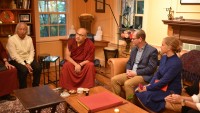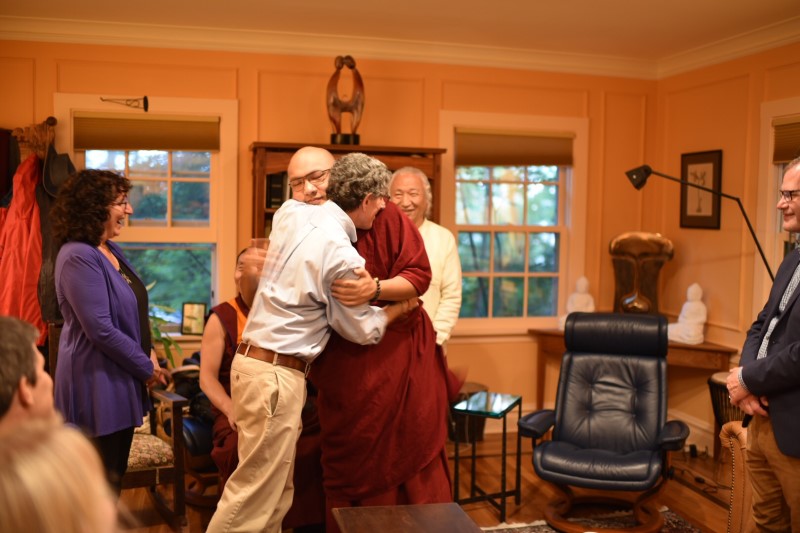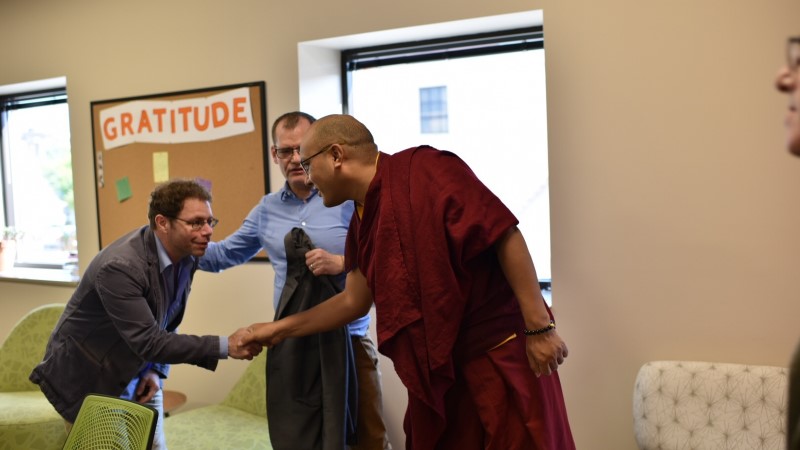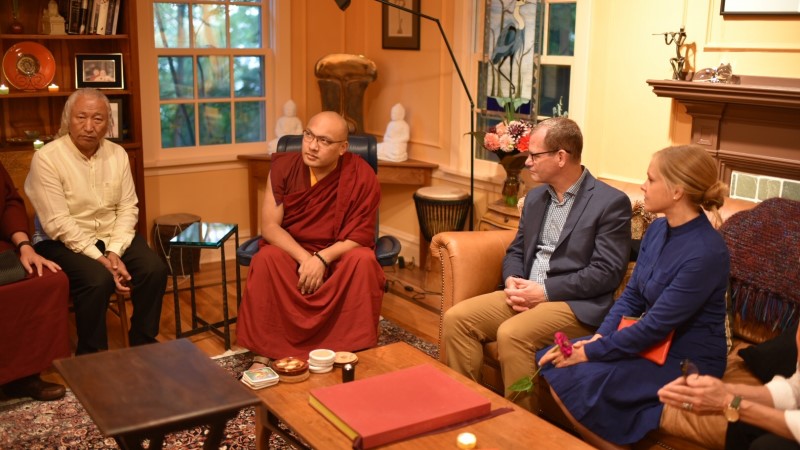法王噶瑪巴訪問威斯康辛大學麥德遜分校
Karmapa Visits University of Wisconsin-Madison
时间:2018年08月31日
地点:美國 威斯康辛州

His Holiness the 17th Karmapa visited the University of Wisconsin–Madison this past week. He was hosted by the Center for Healthy Minds, one of the top research institutions focusing on affective and contemplative neuroscience around the world.
法王噶瑪巴前往威斯康辛大學麥德遜分校,進行為期兩天的訪問。法王此行由健康心理中心接待;健康心理中心為全球研究情感和冥想的頂尖神經科學中心之一。
His Holiness met with the Provost of the University, as well as heads and representatives of different departments and centers on campus over a two-day period. His purpose for meeting with the Center for Healthy Minds, the Center for the Humanities, the Center for Religion and Global Citizenry, the Division of Continuing Studies, the Global Health Institute, the Nelson Institute for Environmental Studies, and the Religious Studies Program was chiefly to discuss how religious leaders could more effectively work with scientists, academics and global experts on addressing environmental and social issues.
法王會見該校的教務長,以及不同學系的系主任和代表,並且參觀校內各個研究中心,其中包括健康心理中心、人文科學中心、宗教與全球公民中心、進修教育部門、全球健康研究院、尼爾森環境研究學院,以及宗教研究計劃,主要討論的內容為:宗教領袖如何更有效的與科學家及專家學者合作,以解決環境和社會問題。
In a meeting with Richard Davidson, the founder and director of the Center for Healthy Minds; Jonathan Patz, the director of the Global Health Institute; and Paul Robbins, the director of the Nelson Institute of Environmental Studies, His Holiness shared his opinion that scientific knowledge is not sufficient in inspiring people to change their behavior.
在與健康心理中心的創建人暨主任理察.戴維森教授、全球健康研究院的主任強納森.帕兹教授和尼爾森環境研究學院的主任保羅.羅賓斯教授會談時,法王表示,科學知識不足以啟發人們改變行為:
He said “science needs religious leaders to help convince people that environmental protection is an urgent moral issue and not only an economic or political one. Without science, people lack the knowledge on how to solve environmental or social problems. But if you can add religious support to scientific expertise, you are able to generate greater courage and commitment among people to address these issues. For this reason, science and religion must find ways to work together.”
「科學需要宗教領袖的協助來說服大眾:環境保護不僅是經濟或政治上的問題,它同時是一個急迫的道德問題。沒有科學,我們會缺乏解決環境或社會問題的知識;科學若有宗教的輔佐,我們就更能激起大眾在解決這些問題上的勇氣和誓願。因此,科學和宗教必須設法攜手合作。」
In between meetings, His Holiness toured the campus and visited the desk of Gaylord Nelson, previous governor of Wisconsin and the founder of Earth Day. His Holiness also made special effort to visit and pay his respects at the Native American sacred burial grounds on the UW-Madison campus.
在會談之餘的空暇,法王便漫步校園,參觀威斯康辛州前州長暨地球日創辦人蓋洛.尼爾森的辦公桌等文物;此外,還特地前往校園內印地安人神聖的埋葬地致意。
As part of the outcome of this visit, His Holiness agreed to attend future events at the university where faith leaders from different traditions are invited to engage scientists, academics, psychologists, economists, policy makers and practitioners on addressing global environmental and social issues.
此行圓滿之際,法王應允出席該校未來的相關活動,亦即不同傳統的宗教領袖、科學家、學術研究者、心理學家、經濟學家、政策制定者及修行者,共同商討解決全球環境和社會問題的方案。


